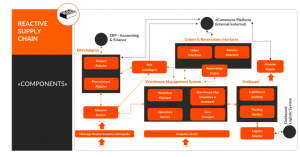Reactive Supply Chain
A modern and scalable managing system for Supply Chain
Bitrock’s Reactive Supply Chain is a modern, state-of-the-art, overall scalable and performing system to implement a full-cycle Supply Chain Management System. The solution is totally modular, so to be implemented as a one-stop-shop for a new project or it can be composed and integrated to existing systems using only the needed components. From functional perspective the system has been designed to implement best practices and to provide the maximum flexibility for all industry standards, but at the same time adapting to each customer specific process and workflow. The solution is based on OpenSource technologies covered by Enterprise Support, and can be scaled to manage millions of SKUs, with all data tracked and analyzed in real time. The delivery of the solution can be provided on Customer Premises or on Cloud or in Hybrid ways.
For internal Supply Chain Operators/Customers who:
- provide/perform analytics
- manage warehouse
- manage resources and goods in and out
- fulfil orders
Our Reactive Supply Chain is an uptodate digital Supply Chain system that scales with business demand and provides best customer experience matching all customer process and system, unlike non-customizable ERP systems which are poorly scaled and not flexible, demanding long time and high costs to be implemented and integrated. Our solution is a highly scalable modular system, implemented on top of the most innovative Open Source technologies (with Enterprise support when needed), capable to enable lean Supply Chain process with real-time analytics and all needed metrics for operation and C-levels with a mid-short term activation & customization time.
Bitrock’s Reactive Supply Chain is designed for:
- Providing high scalable inventory system capable to increase the inventory velocity
- Enabling lean logistic and supply chain management (reducing lead times, yield planning, stock levels, …)
- Compressing cycle time (reducing time from supplier procurement up to the customer delivery)
- Segment and adapt the Supply Chain to different kind of retailers (no monolithic approach)
- Designed to manage SC standards (e.g. GS1) but acting according business logic (B2B and B2C)
- Providing a real-time analytics with all needed metrics (from operational to C-levels) so to achieve the higher automation (possibility to apply Artificial Intelligence to optimize several process) and control
The achievement of these kind of benefits are enabling Direct To Market models by Supply Chain operators and as well more modern integration (and or self implementation) of eCommerce strategies, increasing Supply Chain operators brand identity.

All systems and components are Dockerized, so to allow an easy deployment both on Premises both on a Cloud solution (adding orchestration services such as Docker Compose, or Kubernetes, or Mesos DCOS). All components are configured to use Kafka and provide even a set of REST APIs.
Message broker technology: Confluent Kafka (opensource or enterprise)
Main components technical architecture references: Java/Scala Microservices, Play for APIs and frontend, Akka (with persistence, cluster, http, alpakka) for distributed logic, Cassandra/MySQL, Elasticsearch, Kafka.
Every Microservice has its own architecture and can use different kind of technologies and data source, to grant the best choice for each specific service goal, but a general onion—architecture approach has been taken to keep when possible an uniformity of service architectures.
Analytics: Apache Flink, Spark, Cassandra, Kibana, Elasticsearch, Kafka.


